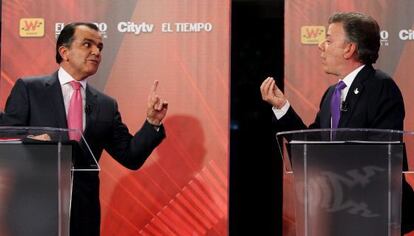Colombian candidates wrestle over FARC negotiations in TV debate
Presidential contenders Santos and Zuluaga stress their divergent views over peace process

Colombian President Juan Manuel Santos and his election rival Óscar Iván Zuluaga faced off in a fresh televised debate on Monday night ahead of the June 15 runoff vote. The presidential candidates emphasized their sharply divergent views on one of the most decisive issues in this election – the peace process with the Revolutionary Armed Forces of Colombia (FARC). They oversimplified their arguments and avoided the subtleties of the issue. Santos, who began negotiating with the FARC in early 2012, said: “We have an opportunity – perhaps for the last time – to reach a peace agreement.” The incumbent president has turned the talks with the rebel army into the most prominent argument for his re-election bid.
Zuluaga, who won the first round of voting two weeks ago, has focused on painting Santos as a traitor who was elected on the Democratic Center Party ticket – because then-president Álvaro Uribe (2002-2010) could not change the law to seek a third term – with plans to corner the FARC. Instead, Santos suddenly began negotiating with them. “You deceived millions of Colombians,” Zuluaga said. “Why did you change?” The Democratic Center Party candidate was forceful and sometimes even aggressive as he spoke directly to the cameras. Both men served as ministers in Uribe’s administration. Zuluaga was treasurer and Santos served as Minister of Defense.
You seek peace with impunity, and I want a peace based on justice”
The contenders began the debate by laying out their significantly different views on the war. Santos insists on acknowledging the armed struggle and not just the political conflict because “if we don’t, then it’s impossible to find a solution.”
Zuluaga called for “negotiating a peace based on the will of those who commit terrorist acts to stop.” He went on to enumerate some of the “minimum” conditions that he will place on the negotiations with the FARC if he wins the election. He called for rebel soldiers to put an end to the “killing of police officers and Colombian soldiers,” to stop laying mines and recruiting children.
Zuluaga drew a clear dividing line: “You seek peace with impunity, and I want a peace based on justice.” He questioned Santos on one of the most sensitive issues for Colombians: the rebels’ political participation once the conflict ends. “I want peace,” Zuluaga began. “But I don’t want to see Timochenko [the chief leader of the FARC] in Congress. Tell the country whether you want Timochenko in Congress.”
Santos reacted by repeating: “There is not and there cannot be impunity.” Then, he said something that went further than the usual conservative script he uses to talk about this sensitive topic. “Someone who commits crimes against humanity should go to prison.” The president said the real difference between him and Zuluaga was that his opponent wishes to prolong the war while he wants to end it.
Zuluaga was more aggressive than in previous debates. Santos took advantage of the situation to radiate an air of serenity, asking his rival to calm down several times. They both called each other liars and fought over who was the better defender of the poor, even though both men sit on the right of the political spectrum. Each candidate tried to present himself as the one who has done the most for rural areas. Zuluaga spoke like a man of the people: “I am from the country, where I began my political career many years ago … I have traveled through every region.” He distinguished himself from Santos who has called himself “the president of coffee growers.” “Then, why did you lose the coffee-growing regions [during the first round]?” Zuluaga asked. The coffee sector is suffering its highest rate of unemployment in years.
Santos defended his administration with figures. “We tripled the budget for agriculture and we amended the existing policies to help small and mid-level farmers.”
Santos and Zuluaga also clashed over the military. Zuluaga said the president’s negotiations with the FARC demoralized Colombian soldiers. He proposed a measure that would allow military personnel to pay for their crimes without serving time in prison. “We are punishing the armed forces and the police corps when we accept with impunity those who murder them.” The Uribe supporter repeated once more that the president’s proposal was for “a peace with impunity.”
Santos defended himself by saying that military offensives have continued even as the negotiations more forward in Havana. And, “for a soldier, peace is victory.”
Translation: Dyane Jean François
Tu suscripción se está usando en otro dispositivo
¿Quieres añadir otro usuario a tu suscripción?
Si continúas leyendo en este dispositivo, no se podrá leer en el otro.
FlechaTu suscripción se está usando en otro dispositivo y solo puedes acceder a EL PAÍS desde un dispositivo a la vez.
Si quieres compartir tu cuenta, cambia tu suscripción a la modalidad Premium, así podrás añadir otro usuario. Cada uno accederá con su propia cuenta de email, lo que os permitirá personalizar vuestra experiencia en EL PAÍS.
En el caso de no saber quién está usando tu cuenta, te recomendamos cambiar tu contraseña aquí.
Si decides continuar compartiendo tu cuenta, este mensaje se mostrará en tu dispositivo y en el de la otra persona que está usando tu cuenta de forma indefinida, afectando a tu experiencia de lectura. Puedes consultar aquí los términos y condiciones de la suscripción digital.








































